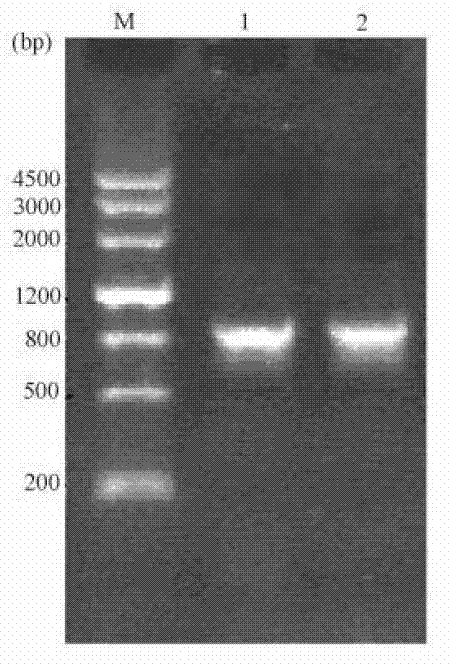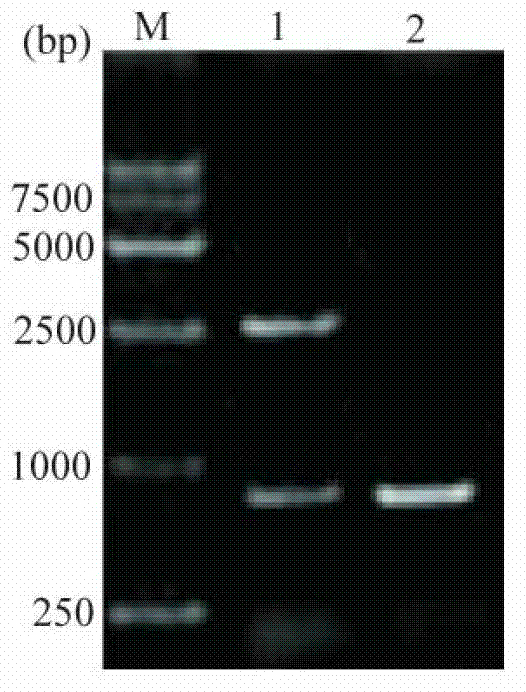Swine transmissible gastroenteritis virus S/N protein fusion gene and recombinant lactococcus lactis, and their use
A fusion gene and infectious technology, applied in gene therapy, recombinant DNA technology, DNA / RNA fragments, etc., can solve the problems of strong virulence, uncontrolled expression, and somatic cell canceration, and achieve ideal mucosal immune protection and strengthen the immune system. Immunogenic effects
- Summary
- Abstract
- Description
- Claims
- Application Information
AI Technical Summary
Problems solved by technology
Method used
Image
Examples
Embodiment 1
[0031] Construction and identification of embodiment 1 MLSN gene Lactococcus lactis secretion expression vector
[0032] 1 Design and synthesis of multi-antigen epitope sequence MLSN
[0033] The S protein of porcine transmissible gastroenteritis virus contains four antigenic sites, A, B, C, and D, among which the A (536-593 residue region) and D (376-392 residue region) antigenic sites are induced Neutralizing antibodies play an important role, and the A antigenic site is a major B cell epitope. Porcine transmissible gastroenteritis virus contains 4 main T cell epitopes, of which the N on the N protein 321 (321-335 residue region) antigenic site can induce the strongest T cell response, and can induce T cells to assist in the synthesis of neutralizing antibodies, that is, specific antibodies against S protein, in vivo.
[0034] Through two flexible Linkers ((GGGGS) 3 ) the A, D antigen site genes and N of TGEV 321 The antigenic site genes are connected (the order is D-Lin...
Embodiment 2
[0074] Expression and identification results of embodiment 2 MLSN gene Lactococcus lactis
[0075] Construction and electrotransformation of Lactococcus lactis with 1MLSN gene
[0076] Mix the ligation product with electrotransformation competent cells NZ9000 (Lactococcus lactis NZ9000 purchased from MoBiTec) and place on ice for 5 min; transfer it to a 2 mm pre-cooled electroporation cup; electroporate with Transformation Apparatus 165-2101, Electric shock parameters are voltage 2kV, time 4.5ms; after electric shock, add 900 μL ice-precooled SGM17MC (GM17 liquid medium, add 0.5mol / L sucrose, 0.02mol / L magnesium chloride, 0.002mol / L calcium chloride) to resume culture and mix well; transfer the bacterial solution to a 1.5mL centrifuge tube, place on ice for 10min; incubate anaerobically at 30°C for 2h; take an appropriate amount of bacterial solution and smear it on GM17 agar medium containing 5μg / mL chloramphenicol, 30 ℃ anaerobic culture for 2-3d. Pick a single colony on t...
PUM
 Login to View More
Login to View More Abstract
Description
Claims
Application Information
 Login to View More
Login to View More - R&D
- Intellectual Property
- Life Sciences
- Materials
- Tech Scout
- Unparalleled Data Quality
- Higher Quality Content
- 60% Fewer Hallucinations
Browse by: Latest US Patents, China's latest patents, Technical Efficacy Thesaurus, Application Domain, Technology Topic, Popular Technical Reports.
© 2025 PatSnap. All rights reserved.Legal|Privacy policy|Modern Slavery Act Transparency Statement|Sitemap|About US| Contact US: help@patsnap.com



